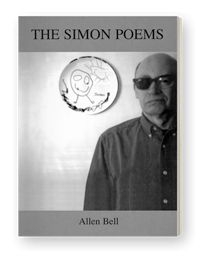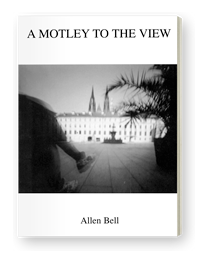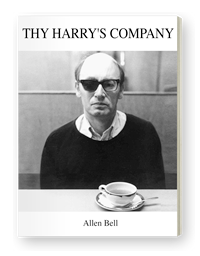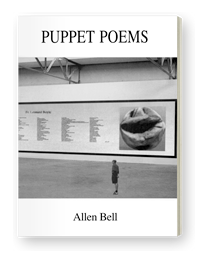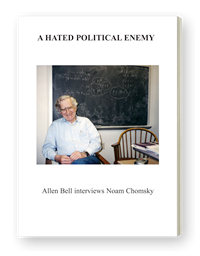Books
CANADA, Allen Bell
Reviewed by J. H. Alexander
Simon
That life is 'scary' is secondary
What is paramount is that you find your own voice
That is the gesture
That will sustain you
With The Simon Poems of the late 1970s, addressed to his young son, Allen Bell found his own distinctive voice. In the present volume, Canada, they are joined by four collections of poetry published subsequently: A Motley To The View, Thy Harry's Company, Puppet Poems, and Ma Vie Va S'achever.'. That final title suggests what we have between these covers is the magnum opus, the result of a lifetime's dedication to the art.
Much of Bell's subject matter is indeed 'scary'. He is very conscious of living, or having lived, in a conspicuously violent century 'Which is arguably the penultimate/ Or last/ And is not even safe' (100). The Holocaust is of course always there in the background. The poet 'can't talk about that' (6), but he can talk about subsequent Israeli violence, and he does, most eloquently with a degree of obliquity in 'Synagogue' from the Motley section. For a Canadian, being extant in a country with a notably violent neighbour is particularly scary. Then there are harrowing examples of violence in Bell's own family history. And there is the potential for violence in himself to be acknowledged.
In one sense Bell's work is 'about' the harnessing of violence (destructive, facile, and tedious) in the service of beauty (creative, rigorous, and invigorating). In sport, e.g. hockey, with its 'penchant/ For violence … hip-checks etc/ And thuggery etc/ Had sullied the vision/ And stopped all the beauty' (163, 167). So it is with most human activities. But in art of stature, e.g. Stravinsky, 'The violence is subsumed/ And charming/ And nice' (5).
This is poetry that sings. As with Samuel Beckett, another victim of savage maternal love, the intense pressure produces continuous melody. Sometimes the reader will be conscious of it, as in the haunting constantly repeated 'Simon' of the first collection, or individual poems with refrains or quasi-refrains such as 'Pinina Pinina' and 'I Have A Tumour In My Brain'. Generally, though, it is more deeply interfused, most characteristically in astonishingly varied sequences of 'and' clauses: childish or childlike; deadpan narrative; emotionally fraught; remorsely and sometimes horrifically accumulative; litanies of villains or horrors; or just expressive of comic bewilderment at the electronic mysteries of the modern age.
The unusual format and layout of this volume are crucial to its impact. In Beethoven's music 'The notes suffer/ But flourish/ And in a silence/ Are clear' (138). Bell's own suffering flourishing notes are set in a silence of carefully calculated spacious pages (23 cm high and all of 16 cm wide), allowing the occasional very long line to make its effect unbroken. The almost complete absence of punctuation increases the effect of a staining of the silence.
This is poetry of admirable linguistic scrupulosity, from the opening lines of the first poem - 'Looking at your golden body/ The dross/ Seems vague' - on to 'adults like to vitiate/ And circumvent (114), and 'I loved Edmund/ Because he was appropriate' (121). Like the film director Frederick Wiseman in the poem 'Monkey', Bell is 'a beautiful stylist/ Spare and elegant/ And very rigorous/ And there was a musical quality/ And there was a crystallizing simplicity' (87). This is not work that draws attention to its own cleverness or complexity. Most often the texture is transparent, the effect immediate, but beware: there are some delayed action time-bombs too.
The linguistic control is matched by the careful and strikingly original organisation of the individual sections. In The Simon Poems every piece is called simply 'Simon'. In A Motley To The View, where political issues hitherto only alluded to are highlighted, the first poem is repeated at the end, establishing the connection with Simon by means of the boy's naive hope after seeing an American Presidential candidate's advertisement: 'this person is saying that if he gets the job/ He won't hurt anybody/ He won't make war/ Oh good/ Then I hope he gets it/ Then there wouldn't be war with that man'. Thy Harry's Company begins with an expansion of the Falstaff allusion of the title and neatly incorporates a corresponding valedictory allusion in the final powerful short poem 'Arthur Bell': 'After I wrote Thy Harry's Company/ I was drained/ And eviscerated/ But finished/ But I thought about you/ (Dad)/ And the poem I never wanted to write/ All my life …'. Puppet Poems is different yet again, with the opening 'Fr. Leonard Boyle' greatly expanded shortly before the end of the section as a tribute to a scholar's integrity to match the poetic integrity of the author. Ma Vie Va S'achever.' consists almost entirely of a single long poem 'Grandfather Was A Nice Pious Person', an impressively understated history of the author's family in Russia and Canada, with a masterly control of an adopted voice; this majestic piece is flanked by a quotation from Walter Benjamin's last letter, the first part constituting a miniscule prose poem 'Arcades', the second being the title of the section.
That last point incidentally indicates that Bell is a marvellously witty writer. The wit can be light-hearted, and there are some very funny poems (e.g. 'The Mustard Seed Society' and 'Whitehorse'); it can also pack a deadly punch, a beautiful violence, as it does with the split Benjamin quotation. It extends even to the collection's front cover with the extraordinary title and a photograph of a blasted tree evidently in a suburban setting. Make of that what you will.
At the end of 'Grandfather Was A Nice Pious Person' Bell's father is made to observe: 'But I think of everything and wonder about life/ What was the point/ If it was worth it/ Maybe it wasn't worth it'. This deeply humane, wise, witty, honest collection suggests that it may (perhaps, just) have been worth it.
J. H. Alexander is Reader Emeritus in English at the University of Aberdeen. He has edited the Edinburgh University Press editions of Walter Scott's The Siege Of Malta, Anne Of Geierstein, Castle Dangerous, Count Robert Of Paris, A Legend Of The Wars Of Montrose, Kenilworth, as well as both the Edinburgh and Penguin Classics editions of The Bride of Lammermoor. Among his publications are Reception Of Scott's Poetry By His Correspondents:1796-1818 [2 vol], Lay Of The Last Minstrel, Reading Wordsworth, and Marmion:Studies in Interpretation and Composition.
